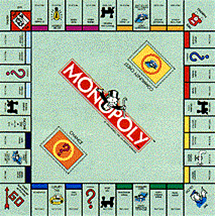A new spam campaign that lures users into a malicious game of Monopoly has been detected.
Websense Security Labs claimed that the campaign is targeting players via social networking techniques. The spam uses a social networking technique to ‘invite' you to play the online board game. It then provides a link to the fake Monopoly game download site, which downloads a trojan.
Websense's email honey pot systems detected over 30,000 Monopoly spam messages on September 21 alone.
Carl Leonard, security research manager at Websense, said: “Thanks to a few dishonest cybercriminals, Monopoly's online gaming experience is at risk. By capitalising on its popularity, social networking techniques are being employed to invite users to play the game online.
“However, instead of linking through to a legitimate site, these links send players to a fake Monopoly download site which downloads malicious software onto the PC of the unsuspecting victim.
“Social networking has significantly changed the way we experience, interact and share content with others on the internet. It has revolutionised our entertainment experiences, but because of the very real risk of malicious software, it's crucial that people have a security solution that can protect both proactively and in real-time. You might opt to ‘take a chance' on the Monopoly board - but you wouldn't want to with your security.”
The Monopoly World Championships, held every four years, will be held in Las Vegas this year and follow a trend of board games being played online that reached a peak with the ‘Scrabulous' version of Scrabble on Facebook.
As one of the most popular games across the world, Monopoly has grown to become the most commercially successful board game in history, with 485 million players worldwide. In more recent times, Monopoly fans have also started playing online.
See original article on scmagazineus.com



_(20).jpg&h=140&w=231&c=1&s=0)

_(28).jpg&h=140&w=231&c=1&s=0)





 iTnews Executive Retreat - Security Leaders Edition
iTnews Executive Retreat - Security Leaders Edition
 iTnews Benchmark Awards 2026
iTnews Benchmark Awards 2026
 iTnews Cloud Covered Breakfast Summit
iTnews Cloud Covered Breakfast Summit
 The 2026 iAwards
The 2026 iAwards











_(1).jpg&h=140&w=231&c=1&s=0)



